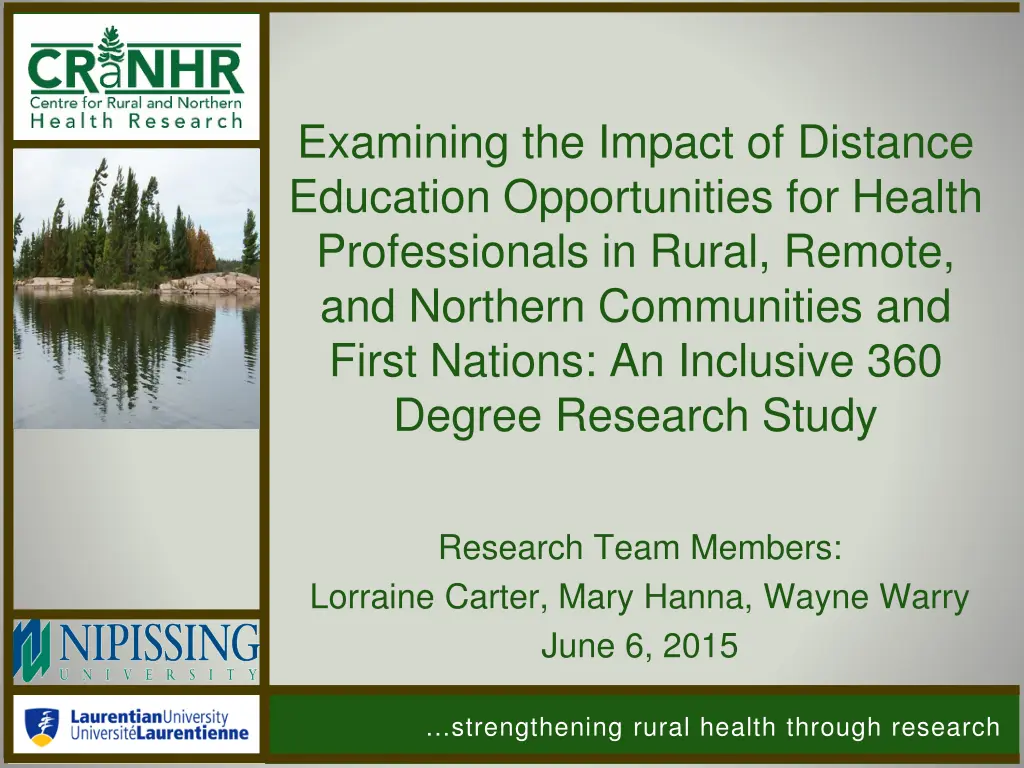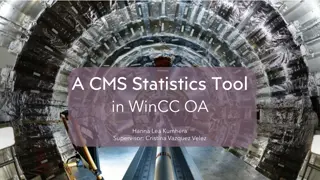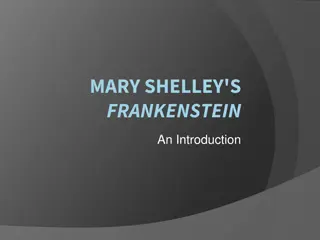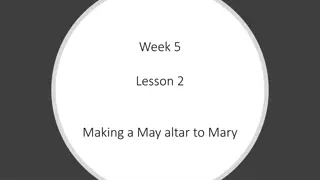
Impact of Distance Education Opportunities for Health Professionals in Rural Communities
Explore the inclusive research study on the impact of distance education for health professionals in rural, remote, and First Nations communities. Investigate aspects of continuing education, professional development, and training, with a focus on e-learning and its benefits. Acknowledge partners and participants contributing to strengthening rural health through research.
Download Presentation

Please find below an Image/Link to download the presentation.
The content on the website is provided AS IS for your information and personal use only. It may not be sold, licensed, or shared on other websites without obtaining consent from the author. If you encounter any issues during the download, it is possible that the publisher has removed the file from their server.
You are allowed to download the files provided on this website for personal or commercial use, subject to the condition that they are used lawfully. All files are the property of their respective owners.
The content on the website is provided AS IS for your information and personal use only. It may not be sold, licensed, or shared on other websites without obtaining consent from the author.
E N D
Presentation Transcript
Examining the Impact of Distance Education Opportunities for Health Professionals in Rural, Remote, and Northern Communities and First Nations: An Inclusive 360 Degree Research Study Research Team Members: Lorraine Carter, Mary Hanna, Wayne Warry June 6, 2015 ...strengthening rural health through research
Faculty: Lorraine Carter and Mary Hanna Relationships with commercial interests: N/A
Administrative Considerations Ethical approval obtained from the Research Ethics Boards of Laurentian University and Nipissing University We would like to acknowledge our various partners including organizations, academic departments, and individuals. Without their generous contributions of time and insight, this study would not be possible. Strengthening rural health through research
Our Goals To examine: key aspects of continuing education, professional development, and training for health professionals in rural, remote, and First Nations communities in northern Ontario perceptions of impact of the learning experience on practice Strengthening rural health through research
E-learning and Distance Education In this study, e-learning is conceptualized as the integration of pedagogy, instructional technology, and, frequently, the internet in teaching and learning environments; distance education refers to situations where there is physical distance between the learner and the instructor Benefits of distance education include time flexibility, convenience, and lack of transportation worries (Du et al., 2013, p.168) No statistically significant difference in learning outcomes achieved through face to face learning methods and e- learning (Cook, 2009) Strengthening rural health through research
Partners and Participants Using existing networks and through active recruitment efforts, six educational series and courses selected for inclusion: four nursing courses for persons who are already nurses and who want to increase their professional credentials; one interprofessional series for health leaders in northern Ontario; one series serving health and allied health professionals working in First Nations Five of six programs delivered out of Northern Ontario; one out of Southern Ontario Learners: 99 participants in total: 55 pre-survey submissions; 68 post-survey submissions; 10 interviews to date Education providers/supporting staff:14 participants Strengthening rural health through research
Data Collection A mixed methods design Pre- and post-surveys were developed for learners; one survey was developed for education providers/supporting staff Survey links, information, and reminders personalized by the research team were disseminated by course administrators Interview call-outs occurred after completion of course/series and after dissemination of the second survey Format: semi-structured; open ended questions; invitation to elaborate on points made in surveys Strengthening rural health through research
Learner Sample Gender Profession Cultural Identity Workplace Geography Predominantly female Predominantly nurses <5% identified as Aboriginal ~40% identified as francophone Communities worked in on a regular basis ~14% other health/allied health professions ~57% northern urban ~37% northern rural ~10% northern remote ~10% male 1- 30 years in their profession First language: ~% 50 English ~% 37 French ~13% other languages 36% work outside province of ON *Learner Sample is denoted by voluntary survey submissions and interviewees only; not all learners within a program Strengthening rural health through research
Key Highlights and Emerging Themes The Professional Learner Strengthening rural health through research
LEARNING STYLES, MIXING OF TECHNOLOGIES When is technology appropriate? Which technology is appropriate? Relationship between technology and learning styles? What about experiential learning? NOT a lesser experience Community of practice PART OF WORKING AND STUDYING IN NORTHERN ONTARIO Not a panacea; institutional and technological issues Resilience and problem solving skills TEACHERS Need for pedagogical knowledge, technical skill, and just in time supports Know students and where they are from Engagement and interaction very important Lens of the educator as student Strengthening rural health through research
The content of the series had an immediate impact on my practice. In fact, I had a conversation with the facilitator right after the first session about a challenge I was facing in my practice. And so the first workshop itself sort of inspired a very particular question and then we were able to sort of go into that a little bit deeper and changed my practice immediately, in some respects. Strengthening rural health through research
[] I had two children instead of going to post-secondary and so once I had raised them all up and started another family, I decided it was time to go back to school. So [academic institution] actually offered the RPN program here kind of like a satellite site and it was a fulltime deal, so I did that and immediately after that I applied for a BScN bridging program. So the whole experience has been one of opportunity Strengthening rural health through research
On Cultural and Geographical Context and Program Planning Involving First Nations I do not have a sense that there is uniform availability or uptake of different technologies for learning [referring to First Nations/remote communities]. There is often budgetary limitations that make it challenging to translate all learning programs into other languages of interest [ ] program planners offering online learning activities may assume the Internet grants 24.7 access to everyone and is inclusive of all cultures despite geography. The topic of the program may determine relevance and target audience. Strengthening rural health through research
Experiences with Aboriginal Partners Few offerings targeting health professionals in northern First Nations Low enrolments in existing programs Need to return to literature and dig deeper (learning styles, the impact of colonization on uptake, attitudes regarding technology in general) Strengthening rural health through research
Questions and Comments Lorraine Carter lcarter0101@gmail.com Mary Hanna mx_hanna@laurentian.ca Strengthening rural health through research
References Cook, D. (2009). The failure of e-learning research to inform educational practice, and what we can do about it. Medical Teacher, 31, 158-162. Du., S., Liu, Z., Liu, S., Yin, H., Xu, G., Zhang, H., & Wang, A. (2013). Web-based distance learning for nurse education: A systematic review. International Nursing Review, 60, 167-177. Lingard, L., Albert, M., & Levinson, W. (2008). Grounded theory, mixed methods, and action research. BMJ, 337. DOI: http://dx.doi.org/10.1136/bmj.39602.690162.47 Nursing Council of New Zealand. (2011). Guidelines for Cultural Safety, the Treaty of Waitangi and Maori Health in Nursing Education and Practice. Ramsden, I. (2000). Defining cultural safety and transcultural nursing [Letter to the editor]. Kai Tiaki Nursing New Zealand. Ruggeri, K., Farrington, C., & Brayne, C. (2013). A global model for effective use and evaluation of e-learning in health. Telemedicine and e-Health, 19(4), 312-320. DOI: 10.1089/tmj.2012.0175 Strengthening rural health through research






















